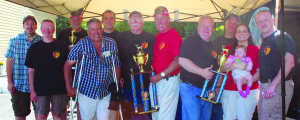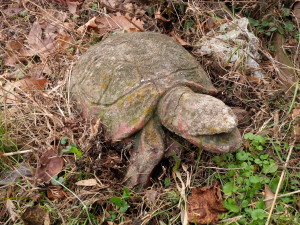Grace Eyler
 On August 15, 2015, the U.S. Crossbow Club (USCC) celebrated its 2nd Annual Awards Banquet. Located on Tower Road in Thurmont, members from across Maryland, and as far away as Ohio, joined together to share stories of their crossbow hunting adventures, to display their mounted trophy animals, and to receive awards for their hunting and fishing accomplishments. Although these USCC members come from all walks of life, the one thing they all have in common is their passion for hunting, fishing, and their crossbows. Dennis R. Britton of Thurmont is the club’s founder and first president. He recalled purchasing his first crossbow at Jefferson Archery in 2008. At the time, Britton was sixty-five years old and could legally hunt with a crossbow, but after reading Maryland’s laws and regulations governing hunting with a crossbow, he found them to be biased, discriminating, and unfair when compared to other legal archery hunting equipment: (1) a crossbow hunter could only hunt on sporadic specified dates of the archery season whereas the traditional bowhunter could hunt every day of the archery season; (2) a crossbow hunter had to be at least sixty-five years old, while the traditional bowhunter had no age limits; and (3) a crossbow hunter had to be physically impaired whereas a traditional bowhunter did not. He recognized the laws and regulations prevented many younger and healthier hunters from having a choice of hunting weapons. A firm believer in equal rights and freedom of choice, Britton campaigned for a change that would benefit all sportsmen across Maryland, regardless of age or disability.
On August 15, 2015, the U.S. Crossbow Club (USCC) celebrated its 2nd Annual Awards Banquet. Located on Tower Road in Thurmont, members from across Maryland, and as far away as Ohio, joined together to share stories of their crossbow hunting adventures, to display their mounted trophy animals, and to receive awards for their hunting and fishing accomplishments. Although these USCC members come from all walks of life, the one thing they all have in common is their passion for hunting, fishing, and their crossbows. Dennis R. Britton of Thurmont is the club’s founder and first president. He recalled purchasing his first crossbow at Jefferson Archery in 2008. At the time, Britton was sixty-five years old and could legally hunt with a crossbow, but after reading Maryland’s laws and regulations governing hunting with a crossbow, he found them to be biased, discriminating, and unfair when compared to other legal archery hunting equipment: (1) a crossbow hunter could only hunt on sporadic specified dates of the archery season whereas the traditional bowhunter could hunt every day of the archery season; (2) a crossbow hunter had to be at least sixty-five years old, while the traditional bowhunter had no age limits; and (3) a crossbow hunter had to be physically impaired whereas a traditional bowhunter did not. He recognized the laws and regulations prevented many younger and healthier hunters from having a choice of hunting weapons. A firm believer in equal rights and freedom of choice, Britton campaigned for a change that would benefit all sportsmen across Maryland, regardless of age or disability.
Britton started in Thurmont with a door-to-door petition to enlighten as many residents as he could about the uneven archery hunting laws. After collecting over 2,500 signatures, Britton then sent the petition to the Maryland Governor’s Office, The Department of Natural Resources, and key state senators. He thought 2,500 votes could convince Governor Martin O’Malley to reverse his way of thinking in an election year, and they did. Beginning with the 2010-2011 Maryland hunting season, crossbows became a legal archery hunting weapon for everyone, without limits or restrictions for the entire hunting season!
In September of 2010, Britton founded the Maryland Crossbow Federation to unite all Maryland crossbow hunters into a single voice, and to represent that voice in all legal crossbow matters.
Britton said, “Because of reputation and popularity, our membership has grown overwhelmingly and has spread into Delaware, Pennsylvania, Virginia, West Virginia, Florida, Ohio, as well as Germany, Canada, and South America. On February 4, 2015, the Maryland Crossbow Federation became legally known as the U.S. Crossbow Club.
Today, Britton and his wife, Lucy, warmly welcome archers to the club’s headquarters and new crossbow range. The site has twenty Ironman targets, with no two targets being placed at the same elevation or distance. It is the only archery range in the state of Maryland to have permanent-placed straight in-line targets at 10, 20, 30, 40, 50, and 60 yards, great for calibrating long distance scopes.
During the awards ceremony, Dennis reminded his fellow members that, “…Our mission as a club is to promote more crossbow hunting and shooting opportunities for everyone, without limits and restrictions, and to recognize each member for their outdoor sports accomplishments.”
The U.S. Crossbow Club (USCC) has the most extensive awards programs in the world.
Britton said, “We have awards for all Maryland and National big game species, in both fair chase and estate hunting conditions,” adding, “We are the first hunting organization to recognize our member’s fishing and crabbing talents, and also the first hunting organization to recognize our member’s harvesting of Maryland and National doe whitetail deer.”
The 2nd Annual All Awards Presentations ceremony began with the club’s Biggest Catch Award, where award recipients reminisced about their fishing stories.
Next, another unique award was presented: the Maryland-National Heaviest Whitetail Doe Award, which was created to (1) allow young whitetail bucks to mature; (2) create award opportunities to those that never see a mature whitetail buck; (3) help in managing our ever-growing whitetail deer herd; and (4) recruit and retain crossbow hunters.
Other awards included Hunter of the Year; Estate Hunter of the Year, for harvesting the most different species of big game animals; and the USCC Golden Arrow Award and Estate Golden Arrow Award, for harvesting the most big game animals of the same species.
After members received their awards, Lucy gathered everyone for a tasty barbecue lunch. Members dined and swapped stories of their outdoor adventures. As the afternoon progressed, members said their goodbyes, and are now looking forward to next year’s gathering.
For more information on the USCC, contact Dennis Britton at 301-271-7001 or at uscrossbowclub@hughes.net.
You do not have to be a Maryland resident or even a U.S. citizen to enjoy the benefits of being a U.S. Crossbow Club member.

 Christine Schoene Maccabee
Christine Schoene Maccabee